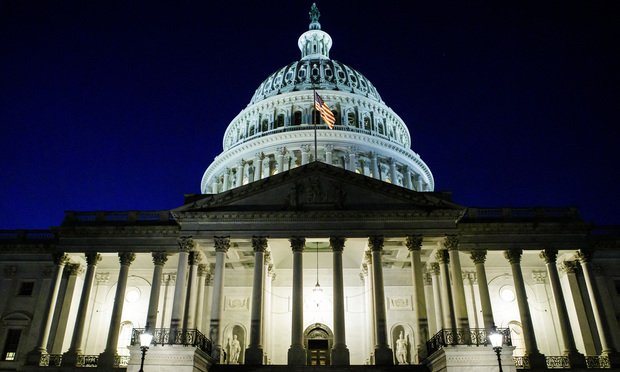 U.S. Capitol Building. (Source: Shutterstock)
U.S. Capitol Building. (Source: Shutterstock)
Americans voted overwhelmingly last week for divided government, an outcome that NAFCU and CUNA think will give an edge to credit unions.
The Democrats kept control of the Senate thanks again to President Biden in the White House and Vice President Kamala Harris casting tie-breaker votes in the Senate. In the House, Republicans seemed headed to win control by a few seats as of Monday afternoon.
Recommended For You
"NAFCU believes that a divided government is the best case for the credit union industry," Greg Mesack, NAFCU's SVP of government affairs, said Monday.
 Greg Mesack
Greg Mesack "Divided government limits either party's ability to move anything extreme or harmful to credit unions," Mesack said. "A divided government also makes it hard to pass many bills without bipartisan compromise."
Both NAFCU and CUNA have claimed strong relationships with leaders in both parties and have said they will work with both sides to support credit unions.
Jason Stverak, CUNA's deputy chief advocacy officer, said Tuesday's split results were "a great opportunity for CUNA."
"We're as welcome in Speaker Pelosi's office as we will be in Speaker McCarthy's office — if it goes that way," Stverak said.
 Jason Stverak
Jason Stverak Meanwhile, CUNA's tally of wins has grown since Wednesday among the House and Senate candidates it supported. By Monday afternoon, 354 of the 398 CUNA-backed candidates had won their elections. Several contests were still undecided.
Democrats cinched control of the Senate over the weekend as CUNA-backed Democrat Sens. Mark Kelly (Ariz.) and Catherine Cortez Masto (Nev.) won re-election.
Democrats could pick up an extra seat if CUNA-backed U.S. Sen. Raphael Warnock (D-Ga.) wins re-election in a Dec. 6 runoff against Republican Herschel Walker. On Nov. 8 neither won more than 50% of the vote required by Georgia to avoid a runoff.
Whatever the final makeup of the next Congress, a report CUNA released Nov. 10 said it will to fight against any changes to the credit card interchange fee system and the credit union tax status, while working to advance field-of-membership modernization, data security, data privacy, charter expansion, CFPB reform, and making sure credit unions have the same ability as banks to handle cryptocurrencies and other digital assets.
"The CUNA-League system will remind Congress that America's credit unions are committed to advancing the communities they serve and improving members' financial well-being," CUNA wrote. "It's important that every American has access to local financial partners who put their financial well-being ahead of the bottom line."
Both CUNA and NAFCU have been fighting the Credit Card Competition Act (CCCA) which threatens interchange fees credit unions earn from credit card transactions. Mesack and Stverak said passage will be tougher without a Democratic House majority.
Mesack said NAFCU also will be watching the lame-duck Congress, "including fighting against any efforts to attach the Credit Card Competition Act (CCCA) to extend the Durbin amendment's interchange network routing requirements to credit cards."
Brad Thaler, NAFCU's vice president of legislative affairs, said the biggest threats to credit unions are often issues small to Congress as a whole that are buried in large legislative packages. If one party controls all branches, a small issue to most lawmakers that could hurt credit unions in a big way could be passed just for expedience.
 Brad Thaler
Brad Thaler When control is split, the parties are forced to negotiate the details, he said.
Among the 54 open-seats with CUNA-backed candidates, CUNA had won 43 seats and lost six seats as of Monday.
Five of the open-seat contests with a CUNA candidate were still undecided:
1. CUNA-backed Republican Juan Ciscomani was leading over Democrat K. Engel in Arizona's 6th district.
2. CUNA-backed Republican Kevin Kiley was leading over Democrat Kermit Jones in California's 3rd district.
3. Republican John Duarte was leading over CUNA-backed Democrat Adam Gray in California's 13th district.
4. Democrat Yadira Caraveo was leading over CUNA-backed Republican Barbara Kirkmeyer in Colorado's 8th district.
5. Republican Mike Erickson was leading over CUNA-backed Democrat Andrea Salinas in Oregon's 6th district.
The results from last Tuesday left Mesack befuddled about voter sentiment.
"Republicans campaigned on inflation and crime, while Democrats campaigned on abortion rights and anti-Trump/Jan. 6th. The races broke so closely it is difficult to tell what mattered more," Mesack said.
"No one could come away and say they saw a clear mandate."
© Touchpoint Markets, All Rights Reserved. Request academic re-use from www.copyright.com. All other uses, submit a request to [email protected]. For more inforrmation visit Asset & Logo Licensing.







